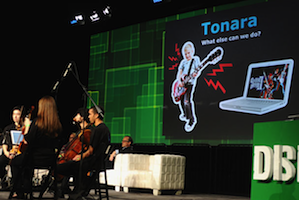
"It's a constant frustration for musicians reading sheet music: When you hit the end of a page, you have to flip to the next — mid-performance." That's the problem, and Tonara is among those offering a solution.
Tonara is the name of both an Israeli technology company and the sheet music software it produces. Tonara, the program, is capable of following acoustic polyphonic scores, showing the musician's real-time position on the score, and turning the pages automatically.
The software was launched as an iPad application during the TechCrunch Disrupt conference in San Francisco two years ago. The presentation on stage included a live string quartet and a vocal performance by Randi Zuckerberg, accompanied by piano, all using Tonara.
The app can be downloaded free of charge, and Tonara offers thousands of both free and paid music scores from Bach to Bruno Mars. These are optimized for the iPad screen size and resolution, plus the option to import other scores from e-mail, web or cloud storage services like Dropbox to create a one-stop digital music binder from both Tonara and third-party sources.

Last month, Tonara announced a new score synchronization feature. What is currently score synchronization allowing musicians to review their practice sessions will, in the future, power stage management functions such as automatic lighting or supertitle changes at concert venues and opera houses:
Tonara’s technology combines audio signal analysis with proprietary algorithms to enable computers to understand notes in live or recorded music. This means that Tonara’s app can now follow any number of notes played simultaneously on any number of different instruments, track the user’s current position in the score even if he or she changes tempo or makes a mistake, and turn the page at the right moment. It can also match any note in a score with the corresponding note in a session recorded on the Tonara app, so musicians don’t have to rewind or fast-forward through audio playback in order to find passages they need to listen to or practice.Tonara is currently positioning the score sychronization feature as a practice tool, but the Ramat Gan, Israel-based startup is also working on partnerships that will use its tech to power things like smart karaoke systems or stage management tools that will enable lights, projected images or subtitles to automatically change based on specific notes or passages in a score.
Not everybody is in favor of the idea. It could be useful for professional pianists, freed of somebody constantly reaching across their field of vision, but automation in general may have serious problems.

